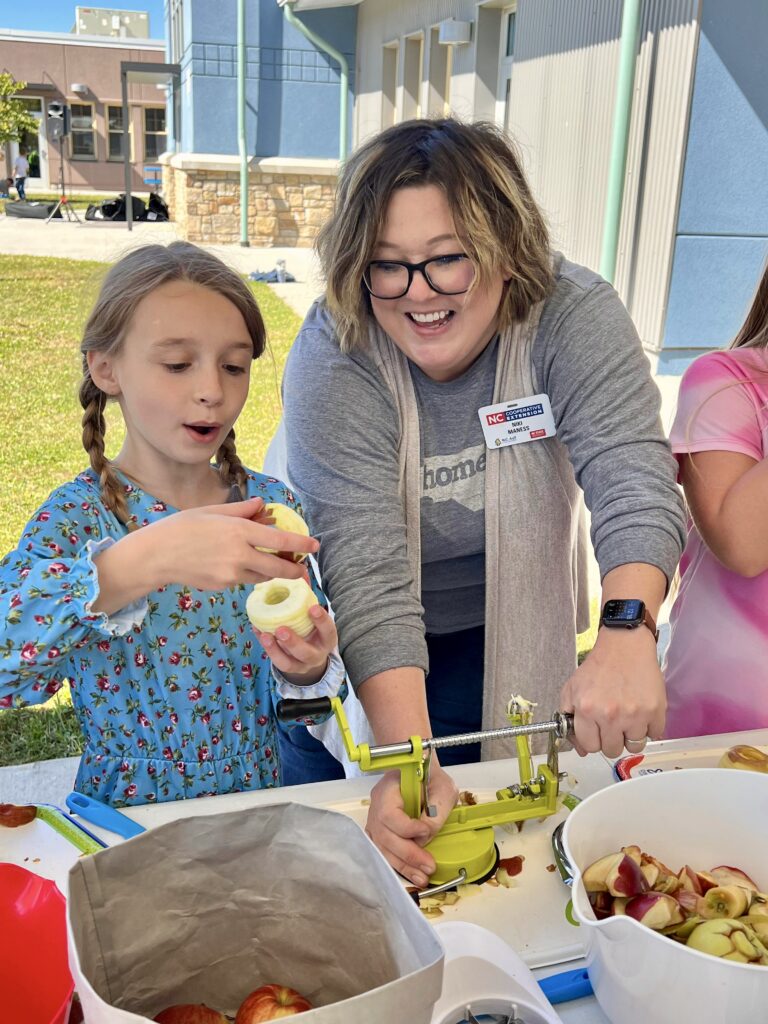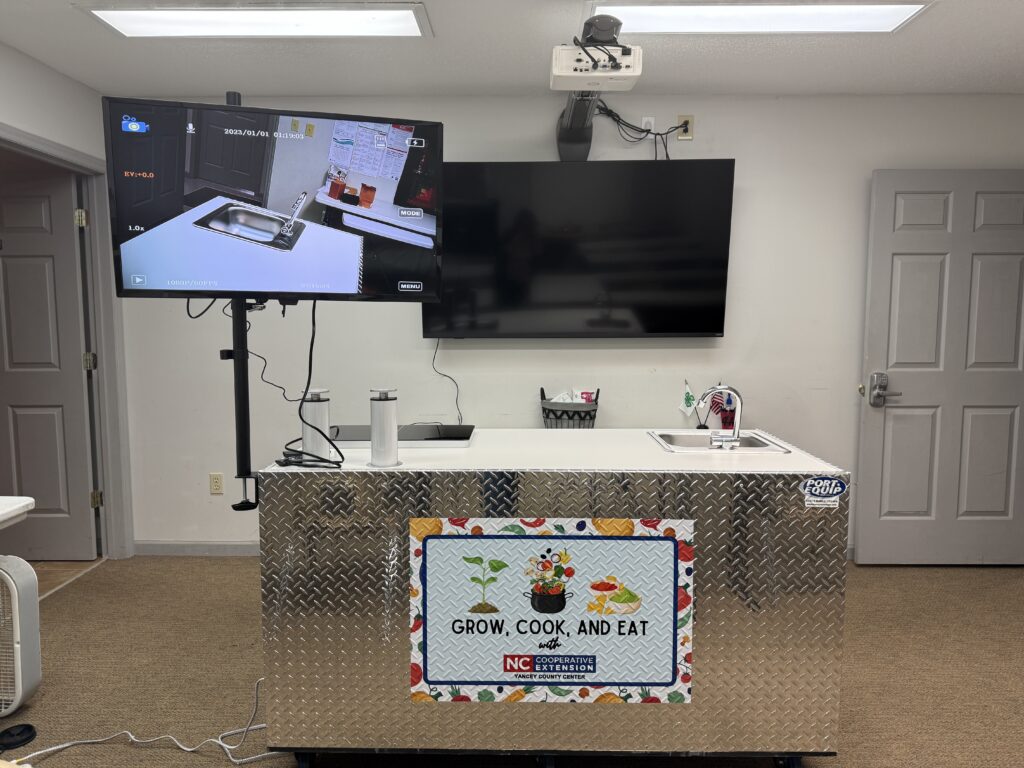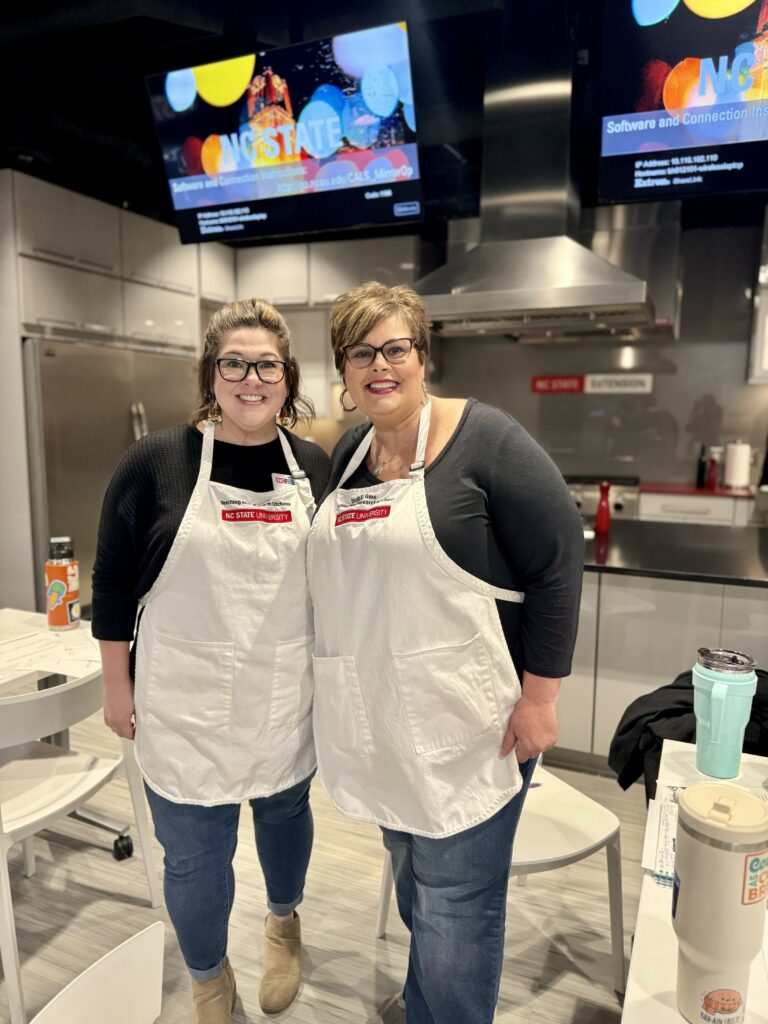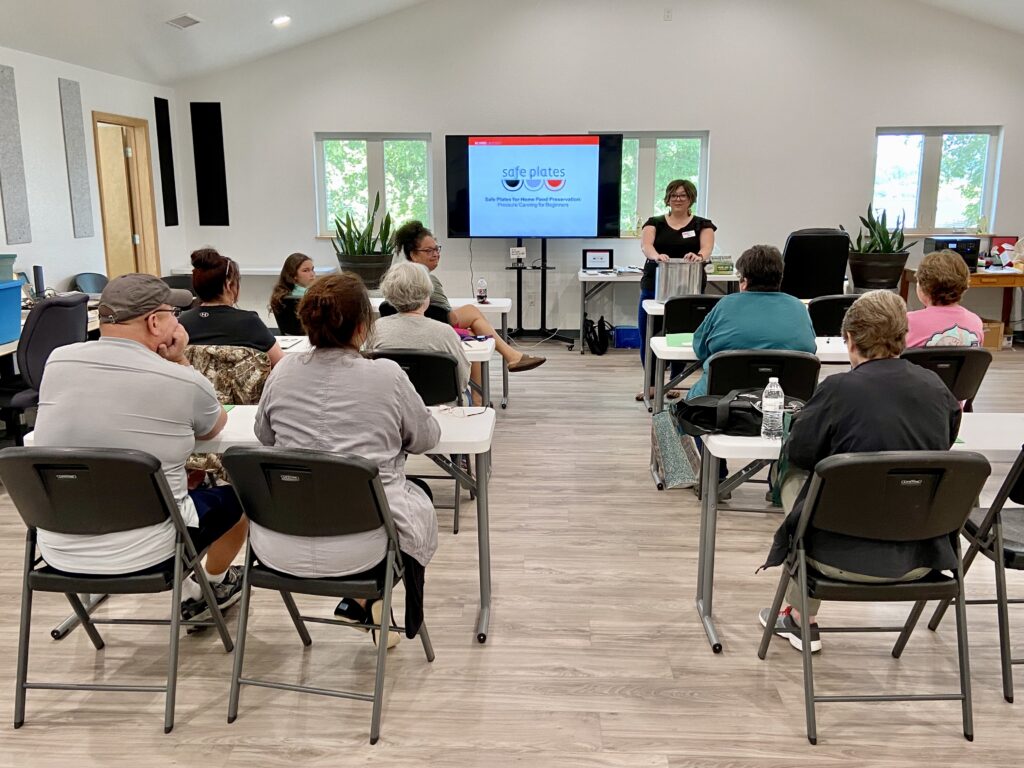Strength After the Storm: A Conversation With Niki Maness
go.ncsu.edu/readext?1080252
en Español / em Português
El inglés es el idioma de control de esta página. En la medida en que haya algún conflicto entre la traducción al inglés y la traducción, el inglés prevalece.
Al hacer clic en el enlace de traducción se activa un servicio de traducción gratuito para convertir la página al español. Al igual que con cualquier traducción por Internet, la conversión no es sensible al contexto y puede que no traduzca el texto en su significado original. NC State Extension no garantiza la exactitud del texto traducido. Por favor, tenga en cuenta que algunas aplicaciones y/o servicios pueden no funcionar como se espera cuando se traducen.
Português
Inglês é o idioma de controle desta página. Na medida que haja algum conflito entre o texto original em Inglês e a tradução, o Inglês prevalece.
Ao clicar no link de tradução, um serviço gratuito de tradução será ativado para converter a página para o Português. Como em qualquer tradução pela internet, a conversão não é sensivel ao contexto e pode não ocorrer a tradução para o significado orginal. O serviço de Extensão da Carolina do Norte (NC State Extension) não garante a exatidão do texto traduzido. Por favor, observe que algumas funções ou serviços podem não funcionar como esperado após a tradução.
English
English is the controlling language of this page. To the extent there is any conflict between the English text and the translation, English controls.
Clicking on the translation link activates a free translation service to convert the page to Spanish. As with any Internet translation, the conversion is not context-sensitive and may not translate the text to its original meaning. NC State Extension does not guarantee the accuracy of the translated text. Please note that some applications and/or services may not function as expected when translated.
Collapse ▲ Niki Maness serves Yancey County Extension as both the Family & Consumer Sciences (FCS) Agent and Local Food Coordinator, playing a crucial role in enhancing community well-being and food security. Her responsibilities include food safety and parent education, food preservation, supporting food entrepreneurs, increasing food access, and promoting public health. Following the significant impact of Hurricane Helene on Western NC, she also added disaster preparedness to her work. Niki thrives on the varied nature of her job, which involves working with a wide range of people and community partners. “My job is always changing and no two days are ever the same, which keeps it exciting,” she shared.
Niki Maness serves Yancey County Extension as both the Family & Consumer Sciences (FCS) Agent and Local Food Coordinator, playing a crucial role in enhancing community well-being and food security. Her responsibilities include food safety and parent education, food preservation, supporting food entrepreneurs, increasing food access, and promoting public health. Following the significant impact of Hurricane Helene on Western NC, she also added disaster preparedness to her work. Niki thrives on the varied nature of her job, which involves working with a wide range of people and community partners. “My job is always changing and no two days are ever the same, which keeps it exciting,” she shared.
Yancey County, with a population just under 19,000, is well-known for its vibrant arts and crafts culture, and for being home to Mount Mitchell, the highest peak east of the Mississippi River (6,684 feet), and Mount Mitchell State Park, North Carolina’s first state park. The county boasts the highest average elevation in the state with several portions of the Pisgah National Forest located within its borders. The local food scene in Western NC is characterized by its unique seasonality and Appalachian-style recipes. Niki notes that the number of farms in the county has decreased over time and they were severely impacted by Hurricane Helene, which reduced the amount of produce available this season. Despite these challenges, Niki enjoys working in her small, close-knit community and embracing its local food landscape.  Each summer, Niki collaborates with a variety of partners to help increase food access through the Summer Food Program hosted by an organization called PATH (Partners Aligned Toward Health. This initiative provides around 120 families with bi-weekly boxes of fresh, local produce and dry goods from May to August. To further increase food access and educate the community about local farms and agriculture, Niki will also teach an “Exploring Ag” 4-H camp alongside Yancey County’s Ag Technician, Ag Agent/CED, and 4-H Agent. She plans to take children to visit local farms, engage in hands-on activities, and participate in cooking experiences.
Each summer, Niki collaborates with a variety of partners to help increase food access through the Summer Food Program hosted by an organization called PATH (Partners Aligned Toward Health. This initiative provides around 120 families with bi-weekly boxes of fresh, local produce and dry goods from May to August. To further increase food access and educate the community about local farms and agriculture, Niki will also teach an “Exploring Ag” 4-H camp alongside Yancey County’s Ag Technician, Ag Agent/CED, and 4-H Agent. She plans to take children to visit local farms, engage in hands-on activities, and participate in cooking experiences.
In addition to these programs, Niki has seen a significant increase in demand for food preservation classes due to frequent power outages after the hurricane. She only taught one class last year but already has scheduled six this year. These classes not only help residents extend the life of seasonal products but also provide methods for food storage when refrigeration isn’t available. Niki is also focusing on disaster preparedness from an FCS perspective. She has begun teaching workshops on how to build a basic 72-hour household emergency kit, drawing on knowledge gained during her master’s program.  Reflecting on the hurricane’s aftermath, Niki shared, “After Tropical Storm Helene, it became clear how unprepared we were and how long the impact would last. We’re still dealing with infrastructure issues, road closures, and service disruptions nearly a year later. These challenges make food safety, nutrition, mental health, and daily preparedness a key part of my job.” Her final project solidified her belief that FCS professionals are well-positioned to support household preparedness, yet are often overlooked in emergency planning. “We offer practical, trusted education and need to be part of local disaster conversations.” She aims to share her disaster preparedness class models with other agents to help them build community-specific resources.
Reflecting on the hurricane’s aftermath, Niki shared, “After Tropical Storm Helene, it became clear how unprepared we were and how long the impact would last. We’re still dealing with infrastructure issues, road closures, and service disruptions nearly a year later. These challenges make food safety, nutrition, mental health, and daily preparedness a key part of my job.” Her final project solidified her belief that FCS professionals are well-positioned to support household preparedness, yet are often overlooked in emergency planning. “We offer practical, trusted education and need to be part of local disaster conversations.” She aims to share her disaster preparedness class models with other agents to help them build community-specific resources.
Another significant achievement for Niki was acquiring her mobile kitchen through an NEAFCS Endowment grant and excess plant sale funds. The Yancey County center lacks a suitable teaching kitchen, and local commercial kitchen spaces are often booked. Niki also observed through informal needs assessment during the Summer Food Program that recipients sometimes didn’t know how to prepare less common produce. “This mobile cart will allow me to take the teaching out of the office and meet them where they are,” she explained. She believes the mobile kitchen will foster stronger partnerships with the farmers market and create new educational opportunities. Niki is happy to share her mobile kitchen research, grant proposal, and images with anyone interested.  Niki advises other local food coordinators in the state to rely on local experts and partnerships, emphasizing the importance of connecting existing resources and identifying areas needing more support. “My advice is to be comfortable not knowing everything,” she shared.
Niki advises other local food coordinators in the state to rely on local experts and partnerships, emphasizing the importance of connecting existing resources and identifying areas needing more support. “My advice is to be comfortable not knowing everything,” she shared.
 Looking ahead, Niki is finding it challenging to be hopeful about the future of local foods, as many small, rural counties are seeing more farmers retire without new energy entering the business. She notes, “The unpredictable and constantly changing climate across the state is affecting how farmers plan and what they grow. The ROI for farmers growing produce is decreasing due to rising costs of materials, equipment, sprays, and fertilizers.” She is also concerned about the potential loss of access to programs like HOP (Health Opportunities Pilot) and SNAP, recognizing their significant benefits to the county. She worries that if residents lose access to affordable, fresh produce, farmers will lose revenue, creating a detrimental ripple effect.
Looking ahead, Niki is finding it challenging to be hopeful about the future of local foods, as many small, rural counties are seeing more farmers retire without new energy entering the business. She notes, “The unpredictable and constantly changing climate across the state is affecting how farmers plan and what they grow. The ROI for farmers growing produce is decreasing due to rising costs of materials, equipment, sprays, and fertilizers.” She is also concerned about the potential loss of access to programs like HOP (Health Opportunities Pilot) and SNAP, recognizing their significant benefits to the county. She worries that if residents lose access to affordable, fresh produce, farmers will lose revenue, creating a detrimental ripple effect.
Despite these challenges, Yancey County farmers continue to supply their community with food. Niki’s uncle, who is a local farmer specializing in tomatoes, is her “local connection for Roma’s to make large batches of Pomodoro sauce that we use year-round as pasta sauce and pizza sauce”. She likes to source other local items from the Farmer’s Market or Davis Farms, the largest local produce stand in the county.  From the aftermath of Hurricane Helene, to the changing agricultural landscape, Niki’s dedication to Yancey County highlights the vital role of Extension agents in building a more prepared, resilient, and food-secure community. Her proactive approach in integrating disaster preparedness and innovative solutions like the mobile kitchen demonstrates a deep commitment to ensuring her community has access to essential resources and knowledge.
From the aftermath of Hurricane Helene, to the changing agricultural landscape, Niki’s dedication to Yancey County highlights the vital role of Extension agents in building a more prepared, resilient, and food-secure community. Her proactive approach in integrating disaster preparedness and innovative solutions like the mobile kitchen demonstrates a deep commitment to ensuring her community has access to essential resources and knowledge.


